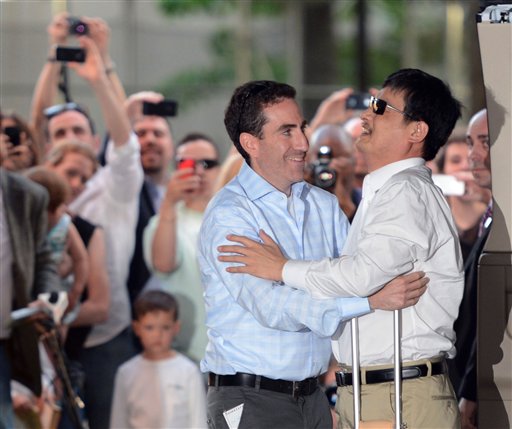By KAREN MATTHEWS
Associated Press
NEW YORK
A blind Chinese legal activist who was suddenly allowed to leave the country arrived in the United State on Saturday, ending a nearly monthlong diplomatic tussle that had tested U.S.-China relations.
Chen Guangcheng had been hurriedly taken from a hospital hours earlier and put on a plane for the U.S. after Chinese authorities suddenly told him to pack and prepare to leave. He arrived Saturday evening at Newark Liberty International Airport and was whisked to New York City, where he will be staying.
Dressed in a white shirt and khaki pants and using crutches, his right leg in a cast, Chen was greeted with cheers when he arrived at the apartment in Manhattan’s Greenwich Village where he will live with his family. The complex houses faculty and graduate students of New York University, where Chen is expected to attend law school.
Chen urged the crowd to fight against injustice, and thanked the U.S. and Chinese governments, along with the embassies of Switzerland, Canada and France.
Chen gave a short statement, which was greeted by cheers in Mandarin and English, but did not take questions from reporters.
The departure of Chen, his wife and two children to the United States marked the conclusion of nearly a month of uncertainty and years of mistreatment by local authorities for the self-taught activist.
After seven years of prison and house arrest, Chen made a daring escape from his rural village in April and was given sanctuary inside the U.S. Embassy, triggering a diplomatic standoff over his fate. With Secretary of State Hillary Rodham Clinton in Beijing for annual high-level discussions, officials struck a deal that let Chen walk free, only to see him have second thoughts. That forced new negotiations that led to an agreement to send him to the U.S. to study law, a goal of his, at New York University.
In New York, he said China had promised him protection of his rights as a citizen there.
Chen’s expected attendance at New York University comes from his association with Jerome Cohen, a law professor there who advised Chen while he was in the U.S. Embassy. The two met when Chen came to the United States on a State Department program in 2003, and Cohen has been staunch advocate for him since.
Before he left China, Chen asked his supporters and others in the activist community for their understanding of his desire to leave the front lines of the rights struggle in China.
State Department spokeswoman Victoria Nuland praised the quiet negotiations that freed him.
The White House also said it was pleased with the outcome of negotiations.
China’s Foreign Ministry said it had no comment. The government’s news agency, Xinhua, issued a brief report saying that Chen “has applied for study in the United States via normal channels in line with the law.”
Chen’s supporters welcomed his departure. “This is great progress,” said U.S.-based rights activist Bob Fu. “It’s a victory for freedom fighters.”
The 40-year-old Chen is emblematic of a new breed of activists that the Communist Party finds threatening. Often from rural and working-class families, these “rights defenders,” as they are called, are unlike the students and intellectuals from the elite academies and major cities of previous democracy movements and thus could potentially appeal to ordinary Chinese.
Chen gained recognition for crusading for the disabled and for farmers’ rights and fighting against forced abortions in his rural community. That angered local officials, who seemed to wage a personal vendetta against him, convicting him in 2006 on what his supporters say were fabricated charges and then holding him for the past 20 months in illegal house arrest.
Even with the backstage negotiations, Chen’s departure came hastily. Chen spent the last 2 1/2 weeks in a hospital for the foot he broke escaping house arrest. Only on Wednesday did Chinese authorities help him complete the paperwork needed for his passport.
Chen said by telephone Saturday that he was informed at the hospital just before noon to pack his bags to leave. Officials did not give him and his family passports or inform them of their flight details until after they got to the airport.
Seeming ambivalent, Chen said that he was “not happy” about leaving and that he had a lot on his mind, including worries about retaliation against his extended family back home. His nephew, Chen Kegui, is accused of attempted murder after he allegedly used a kitchen knife to attack officials who stormed his house after discovering Chen Guangcheng was missing.
Much as Chen has said he wants return to China, it remains uncertain whether the Chinese government would bar him, as they have done with many exiled activists.
___
Associated Press Writers Didi Tang, Gillian Wong and Charles Hutzler in Beijing, Andrew Duffelmeyer in Newark, N.J., and Matthew Lee in Washington, and videojournalist Annie Ho in Beijing contributed to this report.

COMMENTS
Please let us know if you're having issues with commenting.